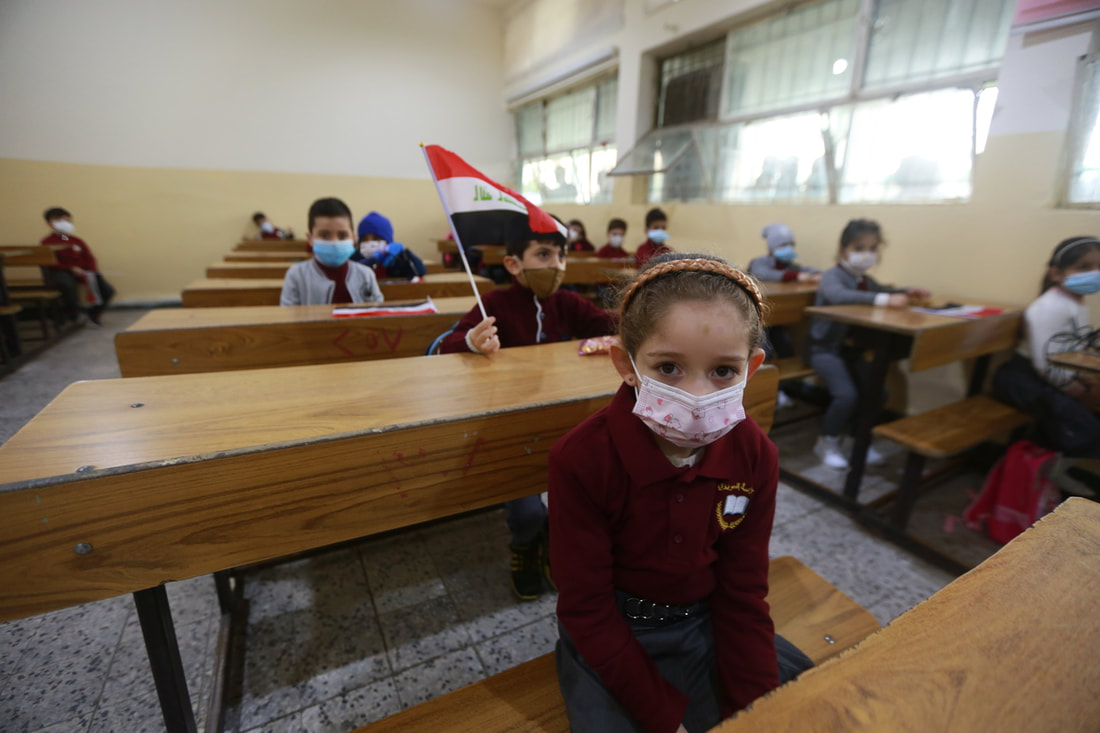The United Nations (UN)'s International Organisation for Migration says that nearly half have been unable to return to their areas of origin and are living precariously on the edges of towns in damaged or unsafe buildings without basic necessities. This perilous situation affects children's ability to attend schools, in particular.
International organisations such as UNICEF continue to issue reports on the impact on children of not attending schools, and the extent of this impact on society as a whole in the future. All reports warn of a delay in the ability to learn, in addition to psychological and physical suffering such as a sense of isolation, anxiety and lack of communication.
Deterioration of education extends beyond IDP children. Iraq now lurches between chaos and catastrophe, a failing state and a failing education system, in what used to be the best education in the region.
Today, there are 3.2 million school-aged Iraqi children out of school and in conflict-affected areas. More than 90 per cent of school-aged children are left out of education. These children are more vulnerable to exploitation and abuse, including early marriage especially for girls, child labour and recruitment by armed actors.
One in every two schools is damaged. Many schools operate in multiple shifts, and the number of qualified teachers has decreased at all educational levels. Iraq's national budget has witnessed a continuous decline in the past years, allocating less than 6 per cent to the education sector and placing Iraq in the bottom rank of Middle Eastern countries.
Since the end of military operations against Daesh in 2017, parts of west Mosul still resemble a warzone with entire neighbourhoods laid to waste. For children of displaced families recovering from conflict-related trauma, resuming school is an essential element to reintroducing a sense of normality and safety. However, the shortage of teachers, many of whom remain displaced, and insufficient school buildings, severely hamper access to education. Classrooms, with as many as 60 students per class, leave many children from the surrounding areas and camps without education.
A new report produced by NORCAP and the Norwegian Refugee Council (NRC) provides a comprehensive analysis of the education system in Iraq. It also highlights the denial of the right to education to an estimated 45,000 children whose parents are suspected of having been affiliated with Daesh.
Over the past 18 years, Iraq's educated and professional class, including teachers, fled in their thousands following the assassinations of colleagues, with devastating effects. Over 830 assassinations have been documented, including 380 university academics and doctors, 210 lawyers and judges, and 243 journalists/media workers.
Iraqi academics, students and professionals urgently need modernised materials and methods for learning and teaching at universities. Many academics also worry about political interference in the sector, a further barrier to development. Services such as public higher education are administered by the government and are subjected to Muhasasa and corruption.
The shutdown of schools last February due to COVID-19 affected over ten million children aged six to 17 across the country. Thus, causing a further decline in education for millions of children who have already lost years of schooling.
To alleviate the education crisis confronting Iraqi children today, the NRC's report recommends urgent measures that the Iraqi government should take, such as scaling up the number of trained teachers in formal schools, making more school facilities for both primary and secondary education available and allowing children without the required civil documents to attend schools. Refugees and displaced students who have been out of school for years need support and accelerated learning programmes to help reintegrate them into the education system.
Besides implementing these recommendations, it is vital to fully fund the education measures called for under the UN's Iraq 2019 Humanitarian Response Plan.
The NRC report stresses the importance of supporting the education of children as an investment in Iraq's future: "If not, a new generation of Iraqi children will be further deprived," and the "prospects for a stable and inclusive Iraqi society in the future will be undermined."
Source (Click Here)


 RSS Feed
RSS Feed